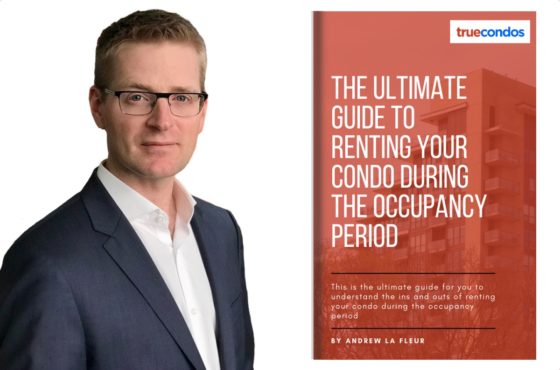Should Condo Investors Fear the Rental Apartment Boom?

[For more information on this topic, check out a podcast I did here]
It seems like once a month now a major rental tower is announced in Toronto. Existing condo sites are being converted into rental buildings, and upcoming high rise sites that last year would almost certainly be condos are today being proposed as rentals.
In most major North American cities this would be no big deal, but remember that in Toronto virtually no purpose built rental apartment buildings have been built over the last 20 years. In fact the bulk of the overall stock of rental apartment buildings was built in the 1960s and 1970s.
Some are describing the rental renaissance happening in Toronto as a ‘rental boom’, and although that moniker is probably taking things too far, it’s true that this is a definite trend worth taking note of – especially if you are a condo investor or you are planning on investing in the condo market.
What’s going on here, and most importantly, how does this emerging trend affect the individual condo investor?
There are 5 major forces at play that all point to the fact that the rental apartment boom is actually good news for condo investors
1) More sites that would normally have been condos are now apartments.
As I mentioned, the first force at play here is the simple fact that more sites that normally would have been built as condo sites are now being built as rental buildings.
Why is this?
Institutional investors and pension funds are always looking for stable long term returns.
Owning rental housing in a growing metropolis is the definition of a stable long-term asset that provides income.
No one is selling any rental buildings (returns are too good, why sell?) so they have to build new themselves. Pension funds also want to take advantage of today’s low interest rates where they can lock in construction financing now and enjoy the great returns in the future.
2) New condo launches way down in 2015
There has been only 1 new project with 116 units was added to the downtown core so far in 2015 (Design Haus Condos). That’s in 4 months time with only a single new condo added to the market. Actually 5 months when you add in December 2014.
This is unprecedented in the last 6 years. Since 2009 I’ve never seen this long a stretch with no new launches.
Now, don’t get me wrong, we are expecting some great new launches this year but it is very clear that 2015 will be far far short of the 2014 and 2013 figures for new product being added to the key downtown core market.
This is part of the maturation of the city or the “Manhattanization” of the city if you want to think of it that way.
It all adds up to this:
LESS AVAILABLE CONDO SITES
+ LESS NEW CONDO SUPPLY
= RISING CONDO PRICES IN THE FUTURE
3) Prices and rents increasing despite record completions
There has been a record number of new condo condo completions over the last 12 months in Toronto.
All the condo bears have been waiting years for this massive surge of new condo supply to hit the rental and resale markets causing prices to crash. Well, it finally happened, and how did the market respond?
Rents are up about 1%
AND prices are up 3-5%
These are both very encouraging signs for the individual condo investor but also the institutional investor looks at this and is much more confident in building a 300 unit rental building for themselves.
If the condo market can not only withstand this kind of record high completions, but actually increase in the face of it, then the future is very bright for this market, especially in the years ahead like 2017-2018 when it is expected the number of completions will be much lower than they are right now based on the lack of recent new launches.
4) Home prices continue to soar out of reach
The average price of a detached home in Toronto is now over $1M. Who can afford to buy a house for a million dollars? Very few people, actually only those people who are already in the housing market for the last 5 years and have built up substantial equity that they carry over. There are essentially no first time buyers buying homes in Toronto any more.
Institutional investors see this as another key reason to get into the rental housing business NOW. There will be more and more people ‘giving up on home ownership’ as one recent article put it in the years to come and they will be long term renters. Just like other major cities in the world, expect the homeownership rate in toronto to slowly decrease over the next decade.
Individual investors will reap the benefits.
More renters and fewer home buyers means increased demand and pricing for condos. Prices and rents for condos will continue to grow as long as new supply is held in check which we already discussed it will be.
5) Millennials prefer renting
Millennials and singles prefer renting. This article talks about this fact as another driver of the rental apartment boom.
Millennials prefer renting partly because this is all they can afford and partly because it allows them to be more transient and gives them greater mobility.
Mobility is the new currency of millennials, they love being able to move to different neighbourhoods every year, take a new job, try a new city etc.
Travel and experiences trump cars and white picket fences for this generation.
Eventually they will look to buy a house, but it will be MUCH much later than previous generations have.
First they will rent for a long time, then buy a condo and live in it for 5+ years, then move up to a house.
Compared to the trend from the last decade which was more like: rent for a short as possible, buy a condo as soon as you can, live in it for 2-3 years then it’s up to a house.
A lot of buyers were getting into a house before age 35 in Toronto. Expect that number to push past 40 for most people.
Conclusion:
These 5 forces or trends as described above are all pointing to the fact that those with foresight to invest in the condo market today will continue to reap the benefits in the years ahead.



